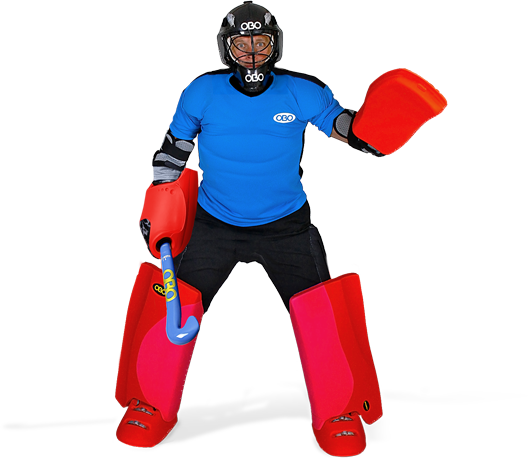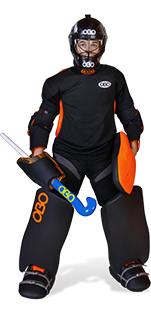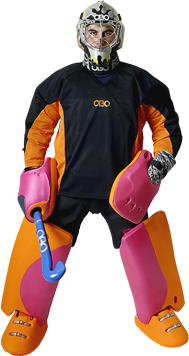KEEPERS RESOURCES

Cross training
"Cross training” (or circuit training) is the phrase used to explain athletes training in other sports than the one that is their main focus (i.e. hockey in our case!), to work on inherent skills like muscle memory, reaction speeds, response time, stamina and tactical awareness/decision making. With so much variety available, multiple sports give the chance for a sportsman (or woman!) to work on aspects of their own game outside the constraints and pressures of their sporting environment. Of course, although if, as internationals, they are going to be playing still with games over the course of the summer when everyone else is resting (on the laurels even perhaps!)
Read More
Plyometrics
With plyometrics (turns out it isn’t plymetrics, even though I thought otherwise, always thought it was plymetrics?!) needed for improving your jumping abilities and also useful for increasing agility and your explosive power, it is important that goalkeepers are made aware of this form of training and added it to their regime of outside-structured-training-training! They are a definitive aspect of athleticism when pushing out athletically and aggressively to save and explosiveness, ensuring an agile and athletic style that should crossover into your game and training sessions. It’s a standard part of training and exercising for football goalkeepers, who are expected to leave their feet to intercept and catch crosses, but they, for some reason, seem a little left out of the hockey repertoire.
Read More
In-season Fitness
Hey goalies 🙂 I’m Soph, a goalie from the Lake District in the UK, and I’ve just been selected to attend the North Women’s U21 regional performance centre. However, at the moment, I’m not the fittest, and need to get fit quick, especially building on core strength. If anyone has any tips/exercises that are … Continue reading "In-season Fitness"
Read More
Strengthen Those Wrists!
Hey guys and gals, “I see so many goalkeepers have there hands down by their sides and then cannot move them quick enough to get them to any aerial shots.” (Quoted from my coach). I do it sometimes i must admit that, but i have found something that can potentially help the lazy people out … Continue reading "Strengthen Those Wrists!"
Read More
Daily Eating Plan
Get used to planning what you’re going to eat each day. Planning helps to stop eating whatever, whenever. Check the labels for the amount of fat, carbs, and protein they contain.This is an example of an eating plan for a player who has a light run in the morning followed by training or game in … Continue reading "Daily Eating Plan"
Read More
Hydration
Drinking adequate amounts of fluid can prevent dehydration, reduce heat disorders, and provide a convenient source of energy. It can get pretty hot in all that gear and fluids help regulate your body's temperature. Ensuring you have sufficient fluids before and during training, can improve your performance. Replacing lost fluid after training helps in your body's recovery.
Read More
How to be a Steel Ball of Muscle
Bruises, sprains, knocks and even broken bones come with the territory of a goalkeeper. Protein helps in the repair and recovery of damaged muscles and tissues, and in the recovery of energy stores. Consuming sufficient amounts of protein enables your body to recovery from training and to build strength. For young goalkeepers, protein is also … Continue reading "How to be a Steel Ball of Muscle"
Read More
How not to be a butterball of fat
Extra weight can slow you down. Although fat helps protect the organs from damage, we prefer our gear to do that. Simply put, if you eat more than your body needs, you get fat. Obviously the moral is not to overeat. Consume enough food to provide energy for all your daily activities - training, recovery, growth etc.
Read More
How to be a Fireball of Energy
How to be a Fireball of Energy
Think of your energy levels as a fire no fuel, the fire goes out and your energy levels decline. You need to continually feed the fire to keep your energy levels up. It's important that you have sufficient fuel before, during, and after your training to keep your fire burning. If you've ever felt tired, light headed, uncoordinated or weak, it might just be that you're low on fuel and your fire is going out. If you have high levels of fuel stored before training, you will be able to use that energy to train harder, for longer. Carbohydrate is the body's fuel that stokes up your fire.
Good sources of carbohydrates come from breads, grains, pastas, fruit and vegetables.
Read More
Nutrition
Nutrition
Today's goalkeeper needs to be a super hero - speed, strength, courage, energy, reflexes, coordination, agility, skill, decisiveness, and determination. It's no longer the fat person who gets put in goal just because they take up the most space.
Read More
Carbohydrate and fluid intake by Rachel Durdin
Fluids
As a goalkeeper we are wearing so much protective equipment that our body cannot effectively cool itself. I am sure you all know the feeling of coming off the playing field after a hard training or game covered in sweat. It is very important to replace the fluid we lose so that our body is adequately hydrated and can perform optimally during the next session.
Read More















